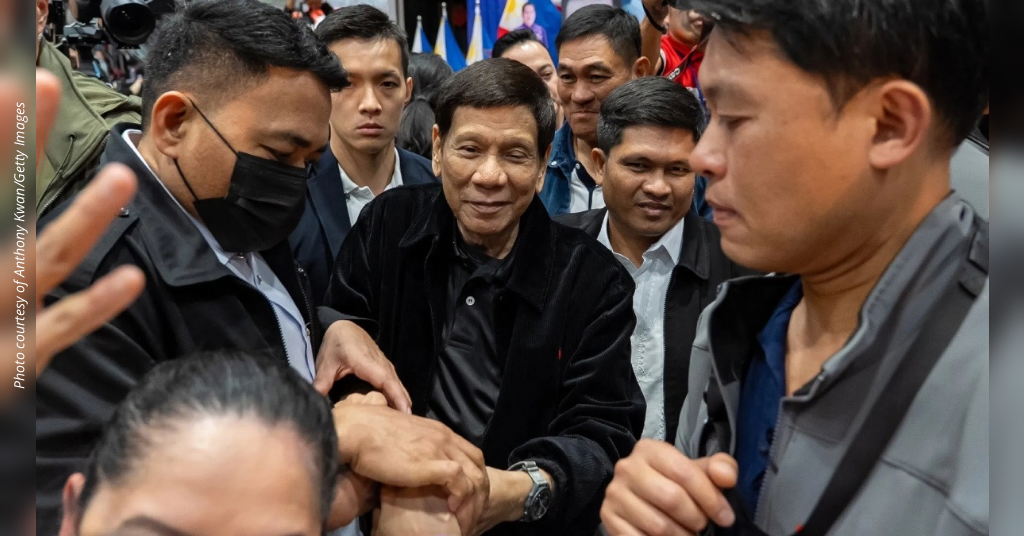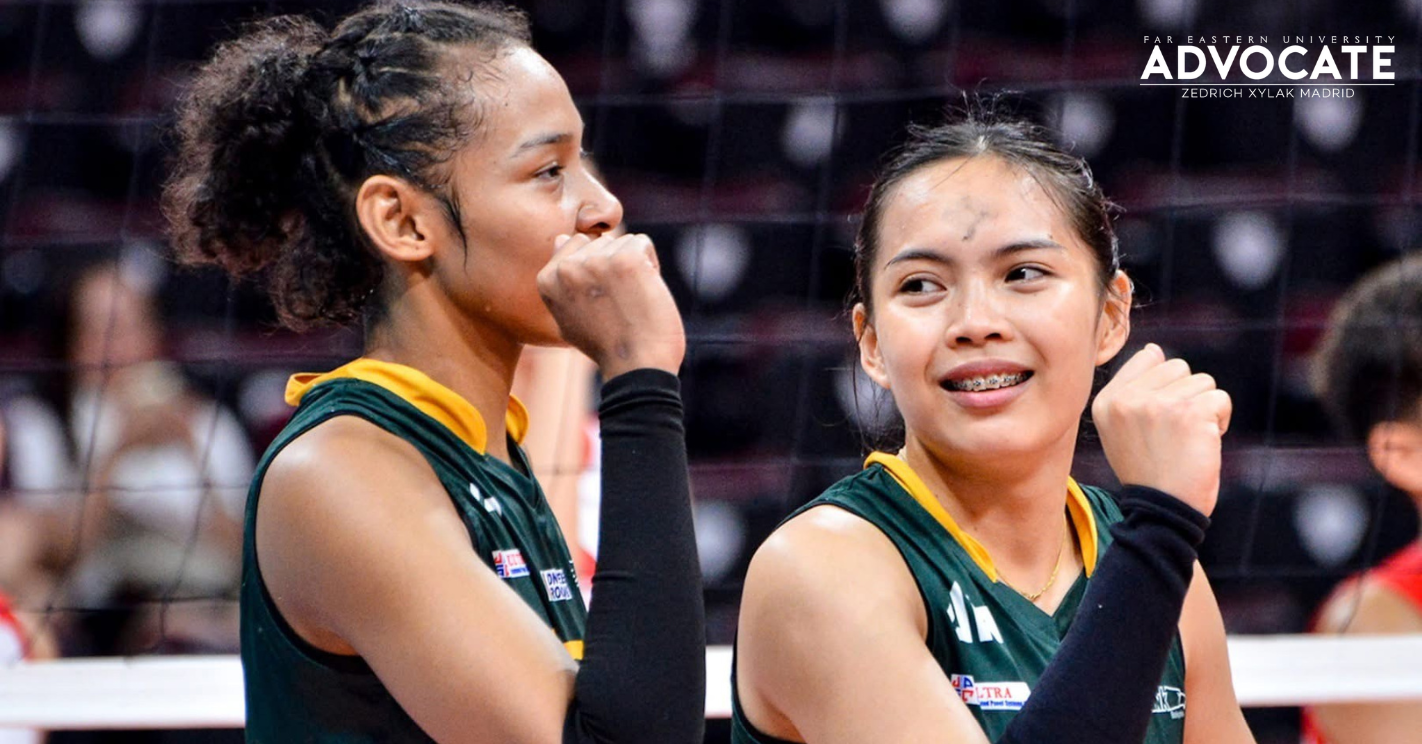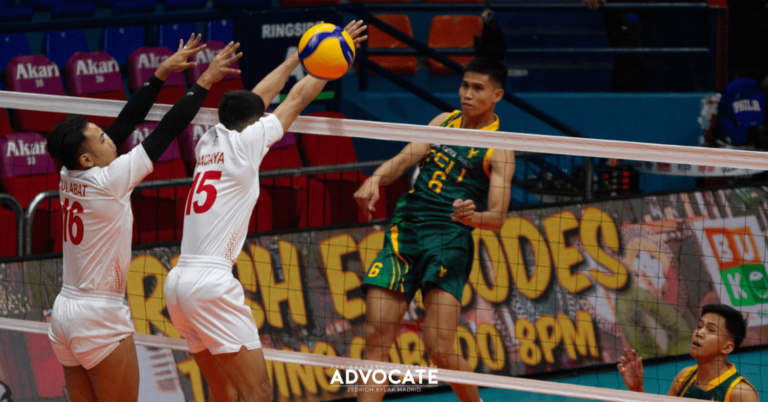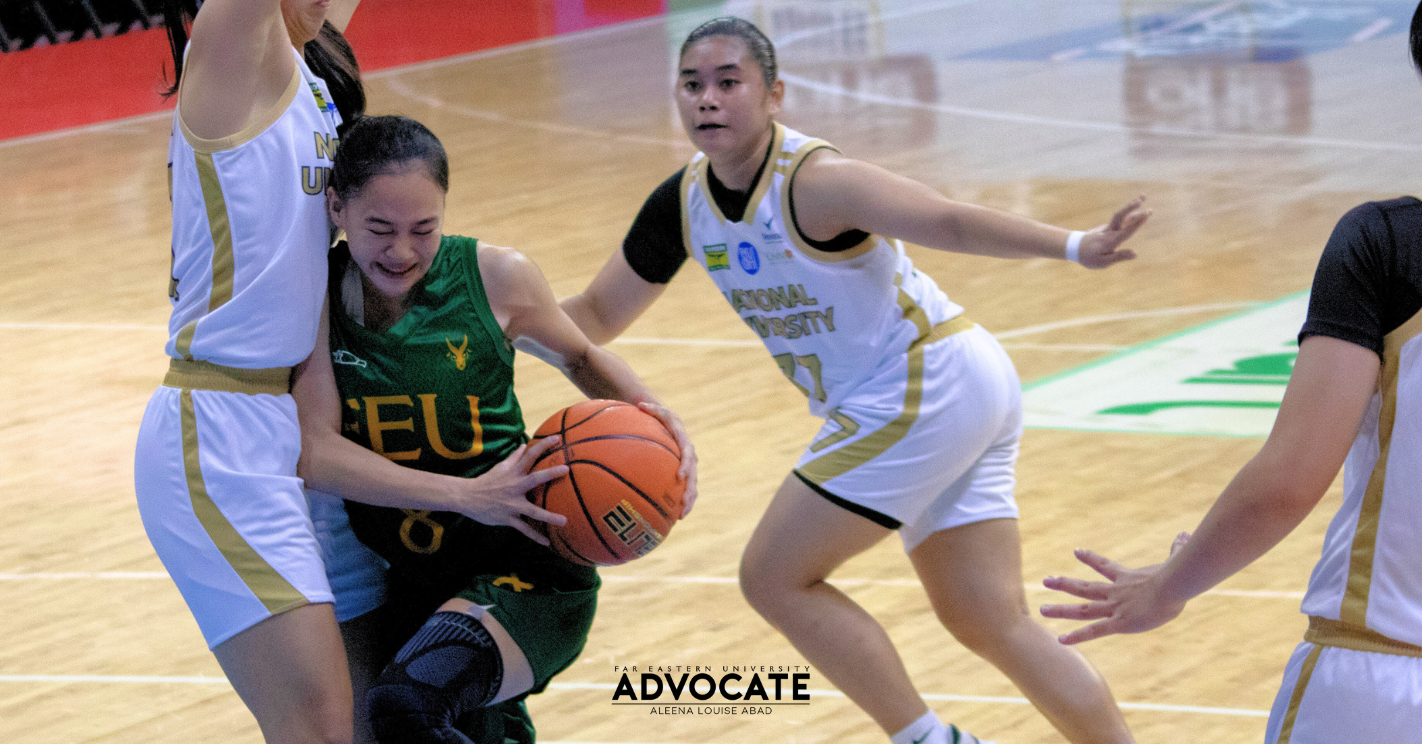
FEU Comm students, tinalakay ang job mismatch sa mata ng expanded cinema
- August 25, 2025 19:27
FEU Advocate
September 28, 2025 13:44

By Franzine Aaliyah B. Hicana
What happens when justice cannot be found in the motherland? For many Tamaraws, the International Criminal Court (ICC) trial of former President Rodrigo Duterte is not just about accountability in the drug war—it is a confrontation of the failures in Philippine democracy. As the world watches The Hague, Far Eastern University (FEU) students ask: will justice finally be found in The Hague? What role must the youth play in demanding truth?
The ICC’s case against former President Rodrigo Duterte stands as one of the most consequential legal battles in Philippine history. At its core are allegations of crimes against humanity—particularly extrajudicial killings—linked to the bloody anti-drug campaign that left thousands dead.
Although the Philippines formally withdrew from the Rome Statute on March 17, 2018, the withdrawal only took effect a year later, on March 17, 2019. Still, the ICC retains jurisdiction over crimes committed while the country was a member, covering the period from November 1, 2011 to March 16, 2019.
For many victims’ families and human rights advocates, this has become their last hope for accountability, especially since local institutions—from the Department of Justice and Philippine National Police’s Internal Affairs Service to the CHR and the courts—have fallen short.
The legal process formally began on September 15, 2021, when the ICC Prosecutor opened an investigation into killings under Duterte’s watch―both as president and as longtime mayor of Davao City. On February 7, 2025, the Prosecutor applied for a warrant of arrest, which was issued the following month.
By March 14, Duterte was in ICC custody, making his first court appearance via video link, where he was informed of the charges and the procedural roadmap ahead. This moment, beamed from The Hague, instantly making headlines across the globe while stirring both recognition and skepticism at home.
Since then, the proceedings have focused on the disclosure of evidence. The prosecution and defense are required to submit detailed lists of witness statements, documents, videos, and other materials they intend to use. Unlike in regular domestic courts, the ICC also facilitates the participation of victims, allowing them to be represented and heard throughout the process.
The most crucial milestone came this September 23, 2025, when ICC prosecutors formally charged former president Rodrigo Duterte with three counts of murder as crimes against humanity.
According to the 15-page filing, Duterte is held criminally responsible as an indirect co-perpetrator in the following: the murder of 19 victims during his mayorship of Davao City from 2013 to 2016; the murder of 14 “high-value targets” in the first years of his presidency; and the murder and attempted murder of 45 individuals in barangay clearing operations between 2016 and 2018.
Even with the case now laid out in court documents, many Filipinos, especially the youth, continue to pass their own judgment—demanding accountability and refusing to forget the lives lost in the so-called ‘War on Drugs.’
On the FEU campus, the trial has become a litmus test for how this generation understands truth, memory, and power.
In an interview with FEU Advocate, second-year Psychology student Janine Ballesteros did not hesitate to recall the brutality that defined the former president’s term.
“Of course, the moments that [stood] out the most when Duterte was still a president [were] about the war on drugs and the extrajudicial killings… many innocent people were involved and killed without thinking about the consequences,” she said.
For her, this period in history explains why Duterte now faces an international court: a legacy built not on discipline, but on fear and violence.
Ballesteros believes the ICC case has put into sharp relief what was missing during those years: the rule of law. To her, the contrast is striking: the very leader who once disregarded due process is now subject to it.
“During his term, due process and accountability didn’t matter… Now that he’s in the hands of ICC, where due process and accountability mattered, it displays that the international system reminds us that all—even the leaders—must follow the law, no matter how powerful they are,” the Psychology student expressed.
First-year Interdisciplinary Studies student Jessica Aubrey Cuenco sharpened the point further, calling out the irony of the moment.
“Duterte’s past leadership style and due process being in one sentence is actually ironic. ‘Due process’ wasn’t even applied during the war on drugs under his term. But now, he is getting what he didn’t even try to practice as a president,” she asserted.
For Cuenco, the trial speaks not only to irony but also to inevitability. She stated that “no matter how much time has passed or how many supporters you have, no one is truly above the law.”
In her eyes, the trial becomes a reminder that even delayed justice is still justice and that consequence—while slow—has a way of catching up.
Both students trace their political awareness back to FEU itself, where conversations about justice and governance are part of lived realities.
For Ballesteros, this atmosphere is impossible to ignore. The trial may be unfolding in The Hague, but its ripple effects are felt in the heart of Manila’s University Belt, where activism and debate are constant companions of student life.
“Studying at a university whose students are very political, or overall just being in the progressive and conscious University Belt, it influences you to have this fiery courage in engaging with issues of this nature,” the Psychology student explained.
Cuenco echoed the same perspective, saying that discussions with peers and professors often remind her they are not just observers of history but participants in it.
For fourth-year Political Science student Kevin Roi Morales, the ICC trial represents both relief and risk. He views it as long-overdue accountability for the victims of the drug war; yet, he also worries about possible backlash from Duterte's supporters and the strain it could place on already fragile institutions.
At the core of his thinking is a belief that justice begins with due process. Morales warned that abandoning this principle would erode the very foundation of Philippine democracy.
“Every official in [the] government must be held accountable in a just and fair trial and due process, no matter how heavy the possible violation. Renegading from the rule of law would spell a disastrous precedent in our country’s legal and social fabric,” he shared.
Still, he admitted that his faith in local institutions remains constrained. He acknowledged the influence the Dutertes still wield and why that makes international adjudication necessary.
“Despite being a former president, their family’s influence remains strong. So to avoid partial adjudication of the case, it is best left in the hands of the International Criminal Court,” Morales expressed.
For him, international bodies may be flawed, ‘bureaucratic,’ and heavily ‘Western-centric,’ as he put it, but they still serve as a crucial safeguard when national systems fail to deliver. That gap in justice, he stressed, should push young Filipinos to stay vigilant.
“I hope that this trial should serve as a reminder to continue the struggle in upholding our democratic values and principles, no matter how perilous the journey may be,” he expressed.
Building on this sentiment, Buklurang Mag-aaral sa Filipino (BUMAFIL) President Christian Raiven Galicia, speaking from the vantage point of student-leadership, noted that the ICC trial is not simply about holding one leader accountable.
To him, it is a reckoning with history and a test of how much a nation is willing to confront its suppressed voices. Galicia recalled that hearing about the trial stirred a flood of emotions—anger, relief, and grief—but also a renewed sense of clarity.
Amid the questions, one truth stood out: voices once muted are beginning to find their echo.
“Nagkaroon na ng tinig at katarungan para sa libo-libong karapatang pantao na minsang niyurakan, at para sa mga boses na pinilit patahimikin noong panahon ng kaniyang pamumuno (A voice and a measure of justice have finally been given to the thousands of human rights once trampled upon, and to the voices that were forced into silence during his rule),” he reflected.
But alongside this hope was a sobering reminder. For the BUMAFIL President, the fact that justice must be sought outside Philippine courts speaks to a deep crisis in the country’s own institutions.
“Bakit tila ba hindi kayang panagutin sa loob ng ating bansa ang mga nagkasala, lalo na kung sila ay nakaupo sa kapangyarihan at may mataas na katungkulan (Why does it seem like those who have committed wrongs—especially those in power and high office—cannot be held accountable within our own country)?” he questioned.
In his view, international tribunals like the ICC matter precisely because local institutions remain captured by those in power. Until the Philippine justice system learns to stand firm against the country’s own elite, accountability will continue to appear foreign, rather than arising from within the nation’s justice system.
As a young Filipino, Galicia admitted feeling the shame this reality brought him, describing it as a resounding slap to Filipino identity—a painful reminder that many in society have prioritized loyalty and silence over truth.
What disturbed him most was the persistence of blind fanaticism, where allegiance to political figures outweighs loyalty to the nation.
“Nakakalungkot isipin na sa halip na ipaglaban ang inang-bayan, mas pinipili ng ilan ang katahimikan at pakikisama (It is disheartening to think that instead of defending our motherland, some choose silence and complicity),” he said, warning how complicity corrodes civic responsibility.
Yet even in his critique, Galicia’s words carried a tone of defiance and hope. He called on the youth to refuse division along partisan lines and instead embrace unity for the country’s greater good.
“Ang tunay na laban ay hindi nasa pagitan ng pula o dilaw, rosas o berde; ang tunay na laban ay para sa Pilipinas (The real battle is not between red or yellow, pink or green; the real battle is for the Philippines),” he stressed.
For him, political colors and party affiliations are distractions from the real struggle: the fight for justice, dignity, and a government that truly serves its people.
In this fight, the BUMAFIL president underscored the indispensable role of student-leaders and organizations. Their responsibility, he argued, is not only to represent but also to protect the voices of their peers.
In his eyes, the power of student voices lies in their ability to demand accountability and inspire courage in those still hesitant to speak.
“Ang ating boses ay ang ating kapangyarihan. At ang kapangyarihang ito ay kailanman hindi mapapatahimik, hindi mabubuwag, at hindi kailanman magigiba (Our voice is our power. And this power can never be silenced, never dismantled, and never destroyed),” Galicia asserted,
Looking forward, Galicia sees the trial not just as a legal battle but as a historical marker. For him, it is a chance for Filipinos—especially the youth—to prove that justice need not bow to wealth, titles, or influence. It is a reminder that change is not handed down but fought for.
In the end, these voices point not to one clear answer but to a shared confrontation with the past. For Tamaraws, Duterte’s ICC trial is less about a foreign court and more about the Philippines itself—showing how leaders and courts failed, and how others refused to be silent.
Their reflections show that justice is not just about punishing one man, but about protecting the memory of thousands and ensuring that future leaders are held accountable.
The students’ responses carry both weight and warning; justice cannot be outsourced forever. While the ICC offers a last resort when local courts fail, its reach is no longer guaranteed for Filipinos after the country’s withdrawal. True accountability must still take root in Philippine soil—otherwise, impunity will persist, and no foreign tribunal will be there to step in.
As history unfolds in The Hague, the question turns back to the Philippines: will the nation’s institutions rise to meet the standard its youth demands? For the Tamaraws who spoke out, the trial is not where things end, but where a longer struggle begins. Justice, they argue, is not only decided in courtrooms—it is fought for in classrooms, campuses, and communities, where voices are sharpened and courage is forged.
(Photo courtesy of Anthony Kwan/Getty Images)









